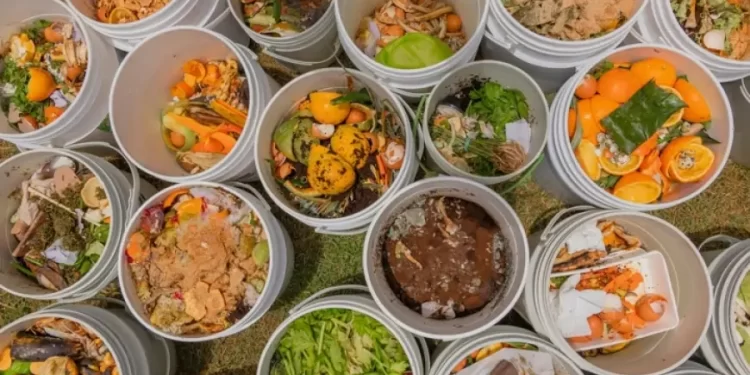Half-finished plates of meals, greens that spoiled within the walk-in, and some stale items of toast from the breakfast buffet don’t sound all that stunning. After every service, restaurant and lodge meals waste isn’t very dramatic, however over time all of the wasted meals actually provides up.
Meals waste is likely one of the most urgent challenges within the restaurant {industry}. It impacts the enterprise’ profitability and sustainability. It additionally has vital ecological, planetary and human implications. Yearly, eating places worldwide generate thousands and thousands of tons of meals waste, contributing to financial losses and environmental hurt. On the similar time, the demand for meals grows and 1 in 11 people on Earth are going hungry.
Restaurant house owners and managers should step as much as the problem of decreasing waste, and fortuitously there are various revolutionary options. By implementing sensible methods, eating places can scale back waste, decrease prices, and meet the growing demand for sustainable eating.
On this article, we outline the issue of meals waste earlier than discussing how meals and beverage companies can scale back waste and improve worth by transitioning to the round financial system.

Defining the Drawback of Meals Waste within the F&B Trade
On a worldwide scale, the United Nations Atmosphere Programme (UNEP) estimates that 1 billion tons of meals are wasted yearly (UNEP). Within the U.S., round 40% of all meals is misplaced between the farm and the fork, with 66 billion kilos stemming from business meals providers (NRDC).
Equally, the UK generates roughly 10.7 million tons of meals waste yearly, with the hospitality and meals service sector contributing round 1 million tons. In the meantime, in Australia, 7.6 million tons of meals are wasted, costing the financial system $36.6 billion yearly (Fight Food Waste CRC).
These alarming statistics underscore the pressing want for eating places to implement meals restoration methods resembling recycling, meals donation, and sustainable waste administration.
Meals Waste within the F&B Service Sector
The meals and beverage (F&B) service sector, encompassing eating places, lodges, and catering providers, considerably contributes to meals waste.
- In the UK, the hospitality {industry} generates over one million tons of meals waste yearly.
- Globally, a 2024 report discovered that 4%–10% of meals eating places buy by no means even reaches a buyer and 31%–40% of meals served to clients isn’t consumed.
This waste usually outcomes from components resembling overproduction, giant portion sizes, and inefficient stock administration. Adopting a round financial system strategy—designing methods to maintain sources in use for so long as potential—can deal with these inefficiencies.
Financial and Environmental Impression
Figures shared by WasteMission.com present the financial implications of meals waste are substantial. Within the UK, edible meals waste per 12 months is valued at roughly £17 billion, equating to £250 per individual. Environmentally, meals waste contributes to eight–10% of worldwide greenhouse fuel emissions, exacerbating local weather change.
By embracing round financial system rules, the F&B sector can scale back these emissions and promote environmental sustainability.
Latest Initiatives and Improvements
To fight meals waste, varied initiatives have been applied, and they’re exhibiting glorious outcomes when the rules of a round financial system are utilized to all steps within the worth chain.
- California grew to become the primary U.S. state to ban “sell-by” dates, a transfer anticipated to avoid wasting greater than 70,000 tons of meals waste every year. (realsimple.com)
- Melbourne-based Fresho are leveraging synthetic intelligence to streamline ordering processes, aiming to cut back the estimated 30–40% wastage within the contemporary meals {industry}. (theaustralian.com.au)
- Finish Meals Waste Australia (EFWA) initiative had spectacular progress in 2024 the battle towards meals waste, with contributors decreasing their general meals waste by 13% since 2022, resulting in 505,000 tons of CO2 equal emissions averted (the identical as taking 210,000 vehicles off the highway for a 12 months).
- Since 2005, South Korea has banned natural waste from landfills. By means of public consciousness campaigns, teaching programs, and a pay-as-you-throw system, the nation has achieved an virtually 100% meals waste recycling fee. (World Economic Forum)
- Lower than 1% of Denmark’s meals waste results in landfills, in response to the European Environment Agency. The federal government promotes prevention, redistribution, and recycling, alongside public campaigns and laws, to reduce meals waste.
Addressing meals waste in each manufacturing, distribution and repair sectors is essential for enhancing meals safety, decreasing environmental influence, and bettering financial effectivity inside the F&B {industry}.

Understanding Meals Loss vs. Meals Waste
Earlier than tackling options, it’s important to distinguish between meals loss and meals waste inside the round financial system framework.
- Meals loss happens throughout manufacturing, storage, and transportation attributable to inefficiencies within the provide chain.
- Meals waste occurs on the restaurant stage, together with unused components, spoiled meals, and plate waste from clients.
In a round financial system, meals loss could be minimized by way of higher provide chain administration, whereas meals waste could be diminished by implementing sustainable enterprise fashions that reuse, repurpose, and redistribute meals wherever potential.

Why Meals Waste Occurs in Eating places
A number of components result in food waste in restaurants, together with:
- Overproduction: Making ready an excessive amount of meals to fulfill unpredictable demand.
- Portion Sizes: Outsized servings resulting in uneaten leftovers.
- Stock Mismanagement: Substances expiring earlier than use attributable to poor monitoring.
- Menu Complexity: Giant or sophisticated menus growing the danger of unused components.
- Lack of Employees Consciousness: Workers discarding meals that may very well be repurposed.
By shifting to a round financial system strategy, eating places can deal with these inefficiencies by way of smarter procurement, waste monitoring, and meals repurposing initiatives.
Methods to Cut back Meals Waste in Eating places Utilizing the Round Financial system
The round financial system is an financial system that focuses on decreasing waste and profiting from obtainable sources by selling practices resembling reusing, recycling, and repurposing supplies. In contrast to the normal linear financial system, which follows a “take-make-dispose” mannequin, the round financial system seeks to shut the loop by maintaining sources in use for so long as potential.
Within the restaurant {industry}, this implies minimizing meals waste, optimizing provide chains, and repurposing surplus meals into new merchandise.

1. Optimize Stock Administration By means of Round Practices
Utilizing digital stock monitoring methods will help eating places monitor inventory ranges, observe expiration dates, and scale back pointless purchases. Instruments like AI-driven forecasting can predict demand and reduce surplus ordering.
Based on Prof. Carlos Martin-Rios, “Expertise is revolutionizing waste administration in hospitality, serving to companies make data-driven selections that enhance sustainability.”
2. Alter Portion Sizes and Menu Design to Align with the Round Financial system
Providing versatile portion sizes permits clients to decide on a meal that fits their urge for food, decreasing plate waste. Eating places may analyze gross sales knowledge to refine menus, eliminating objects that generate extreme waste. Moreover, components could be repurposed into new dishes, guaranteeing most utilization.
3. Prepare Employees on Round Financial system Waste Discount
Workers play an important function in minimizing meals waste. Coaching kitchen workers to make use of all edible elements of components (e.g., vegetable stems in shares, citrus peels for flavoring) can considerably minimize waste. Educating servers on portion strategies and meals storage greatest practices is equally necessary.
4. Implement Meals Donation Applications to Shut the Loop
As an alternative of discarding surplus meals, eating places can accomplice with native meals banks and charities. Many organizations facilitate meals redistribution, guaranteeing edible meals reaches these in want moderately than ending up in landfills. In a round financial system, meals donation is a key technique for minimizing waste whereas addressing meals insecurity.
5. Compost and Repurpose Waste to Preserve Circularity
Meals scraps and unavoidable waste could be composted or transformed into animal feed, decreasing landfill contributions. Some eating places additionally collaborate with farms to return natural waste to the soil, closing the sustainability loop and selling regenerative agriculture.
6. Companion with Sustainable Suppliers to Assist Circularity
Working with distributors who use sustainable packaging and accountable sourcing practices helps reduce waste earlier than components even attain the kitchen. Establishing native provide chains can scale back spoilage attributable to lengthy transportation occasions and helps the round financial system by maintaining sources inside localized methods.
The Function of Luxurious Eating places in Main the Round Financial system Motion
Luxurious eating institutions have the chance to set {industry} requirements for sustainability. Excessive-end eating places can implement round financial system rules by utilizing premium however sustainable components, decreasing packaging waste, and innovating with zero-waste eating ideas.
As an illustration, some luxurious eating places repurpose kitchen scraps into connoisseur dishes or collaborate with sustainability-focused manufacturers to reinforce their eco-conscious status.
As Prof. Carlos Martin-Rios notes, “The posh sector is uniquely positioned to affect industry-wide change by demonstrating that sustainability and high-quality eating can go hand in hand.”
By embedding round financial system rules into their enterprise fashions, luxurious eating places can improve their model picture, appeal to eco-conscious shoppers, and pave the way in which for a extra sustainable hospitality {industry}. So, with all these advantages in view, what’s stopping eating places from decreasing meals waste?

Challenges Undermining Meals Waste Administration Initiatives
Whereas the ideas mentioned on this article will help restaurant house owners and managers to grow to be extra conscious of the components that contribute to meals waste, implementing new practices and shifting mindsets at an operational and management stage could also be difficult. Prof. Carlos Martin-Rios concluded, in his writings about food waste management innovations, that any try at implementation should essentially deal with the next challenges:
- Lack of Customization: Foodservice institutions wrestle to determine which revolutionary practices greatest go well with their particular wants for meals waste discount, reuse, or recycling.
- Restricted Consciousness: Many foodservice managers lack data in regards to the alternatives, challenges, prices, and advantages of meals waste improvements.
- Social and Skilled Limitations: Conventional waste administration applications usually overlook the social {and professional} expertise required for efficient meals waste administration, creating resistance to alter.
- Low Curiosity in Systematic Innovation: Waste administration improvements will not be extensively seen as a strategic, systematic course of, limiting their adoption.
- Value-Pushed Resolution Making: Foodservice suppliers prioritize cost-saving measures over sustainability efforts, usually ignoring waste administration improvements until they provide clear monetary advantages.
- Information and Coaching Gaps: Trade professionals sometimes depend on present waste disposal strategies moderately than implementing structured waste discount methods. There’s a robust want for coaching and government-led goal-setting.
- Operational Challenges: Day by day issues associated to sorting, storage, and disposal make it troublesome for meals companies to give attention to innovation past the recycling choices supplied by native councils.
- Restricted Trade Management: The foodservice sector just isn’t actively main waste administration innovation. Whereas consciousness is growing, few companies are adopting zero-waste practices or creatively repurposing meals scraps.
Conclusion
Lowering meals waste in eating places is not only about sustainability—it’s additionally a key pillar of the round financial system. By optimizing stock, coaching workers, redesigning menus, and embracing know-how, eating places can transition to a extra sustainable, round enterprise mannequin.
Sadly, many challenges hinder the adoption and deployment of sustainable strategies within the meals and beverage {industry}. Margins are tight and points resembling perishable merchandise and world provide chains add complexity. But, as client expectations shift towards sustainable eating, eating places that proactively deal with meals waste inside a round financial system framework might be well-positioned for long-term success.
The time to behave is now—embracing round financial system rules is not optionally available however important for the way forward for the meals and beverage {industry}.

Contact Veronika on LinkedIn.







